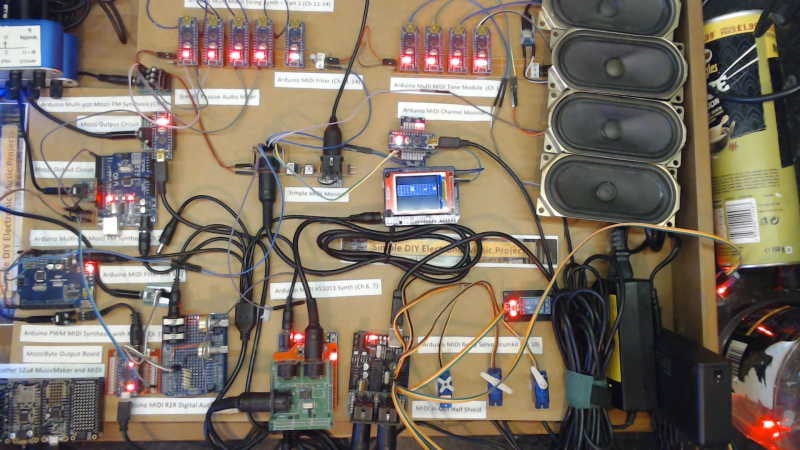We’ve seen a great many Arduino synthesizer projects over the years. We love to see a single Arduino bleeping out some monophonic notes. From there, many hackers catch the bug and the sky is truly the limit. [Kevin] is one such hacker who now has an Arduino orchestra capable of playing all seven movements of Gustav Holst’s Planets Suite.
The performers are not human beings with expensive instruments, but simple microcontrollers running code hewn by [Kevin’s] own fingertips. The full orchestra consists of 11 Arduino Nanos, 6 Arduino Unos, 1 Arduino Pro Mini, 1 Adafruit Feather 32u4, and finally, a Raspberry Pi.
Different synths handle different parts of the performance. There are General MIDI synths on harp and bass, an FM synth handling wind and horn sections, and a bunch of relays and servos serving as the percussive section. The whole orchestra comes together to do a remarkable, yet lo-fi, rendition of the whole orchestral work.
While it’s unlikely to win any classical music awards, it’s a charming recreation of a classical piece and it’s all the more interesting coming from so many disparate parts working together. It’s an entirely different experience than simply listening to a MIDI track playing on a set of headphones.
We’d love to see some kind of hacker convention run a contest for the best hardware orchestra. It could become a kind of demoscene contest all its own. In the meantime, scope one of [Kevin’s] earlier projects on the way to this one – 12 Arduinos singing Star Wars tracks all together. Video after the break.

















Thank you for featuring my Lo-Fi Orchestra! If anyone makes it through all seven movements, do let me know in the comments what you thought of any of them and if you have a favourite. I still can’t decide between Mercury and Uranus.
If anyone would like to know more about the individual projects they are all on my project blog and there are links and descriptions in the linked article.
If Lo-Fi DIY 8-bit synthesis isn’t your thing but you want to hear an amazing electronic version of The Planets but have never heard Tomita’s version, I would really urge you to look it up. It is quite something.
Kevin
This is great ! Accomplishment was well worth the effort. Holst’s – The Planets was one of my favorites as kid along with Ferde Grofe’ -Grand Canyon Suite. (Mom made sure us kids learned classical music to offset the “godless” music we listened to on WLS Chicago in the 60″s 😁) . One thing, hearing this made me close my eyes and pretend I was sitting behind a Tandy CoCo, Commodore 64, etc… playing a video game. 😁
But you were listening to an amazing radio station then, WFMT.
Amazing effort! Sounds good. I am looking for something much simpler, there was an arduino project that used just 2 pots as controllers and made fairly random music like noises. Desperately searching archives for this but I don’t know what what to call it, most of my searches turn up synths and tone generators. Cab anyone help?
The simplest noise making project of all is probably the “atari punk console” based on a timer. That is often used with two pots or two LDRs. Next up would be something like creating an Arduino tone with a frequency based on a potentiometer reading – that kind of thing. Then you could start using multiple potentiometers to control a Mozzi based software synthesizer…
Here are some links that might be the kind of thing you are after:
* https://diyelectromusic.wordpress.com/2020/12/12/556-timer-light-theremin/
* https://diyelectromusic.wordpress.com/2020/06/01/arduino-tone-generator/
And if you wanted simple synthesis:
* https://diyelectromusic.wordpress.com/2020/08/12/arduino-pwm-midi-synthesis-with-mozzi/
* https://diyelectromusic.wordpress.com/2020/12/07/auduino-granular-synthesis/
Good luck!
Kevin
Thanks Kevin, I found something similar to what I want, in a link off your last reference above. (https://code.google.com/archive/p/tinkerit/wikis/Auduino.wiki ). The one I originally saw was newer than that one and happened to have been written up as a Hackaday project. Also it only use 2 pots. But this link is a great start I can either use it or maybe the words (such as “granular synthesis” ) will help me find the one I was remembering.
These things are unusual and interesting (to me) since they are like a playable instrument but produce quite unpredictable results.
Thanks Again from Mike Avison
Doh my memory fails, it does use 5 pots and here it is
https://hackaday.com/2008/11/17/auduino-software-synth/#more-5987
Thanks
Nicely done! I could quibble a bit about dynamics, but you did position it as lo-fi. I’d just like to hear it in person with some space between the instruments so we could hear the individual sections/performers better. If you do a real audio mix, that’s something to consider. Could also yield some interesting visuals, especially if you pick status LED colors by instrument and do some shadow-casting behind the “stage”.
And yeah, Tomita’s stuff is fun. He wasn’t as pure an arranger as W. Carlos — he’s a bit self-indulgent in adding his own material to the recordings — but he did produce very listenable music, still working in the age of big modulars, tape splicing, and recording each patch on its own track for later mix-down.
Folks sometimes forget just how spoiled we are by comparison, with DAWs and soft-synths and MIDI. It’s good to hear folks periodically go back to more limited toolkits; being forced to work harder can help drive innovation.
I only watched to see what the servos did and … they did nothing. (I did fast forward a lot so maybe I missed it though) oh yeah, nice project too :P
Haha – no, the servos don’t feature in the planets :) If you want to hear them in action, try this one…
https://youtu.be/hJZL8WXBSvc
This is immensely cool! What a well sounding and charming hack :-D
Couldn’t resist!! Sing this to “The Twelve Days of Christmas”
11 Arduino Nanos,
6 Arduino Unos,
1 Arduino Pro Mini,
1 Adafruit Feather 32u4,
and finally, a Raspberry Pi.
(checks date)
Yep. I have time to arrange that for the Lo-Fi Orchestra… :)
Last year, it performed part of Hely-Hutchinson’s Carol Symphony… https://youtu.be/pX6G2a1NNFc
Kevin